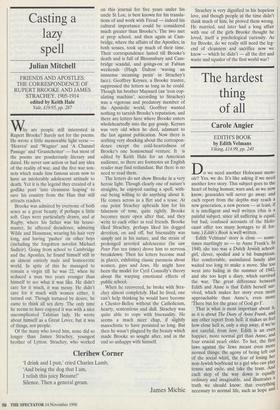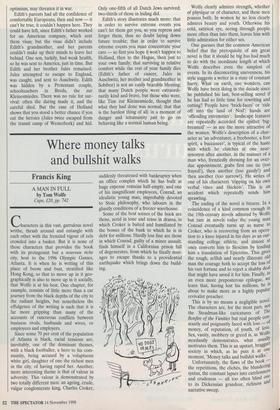The hardest thing of all
Carole Angier
EDITH'S BOOK by Edith Velmans Viking £14.99, pp. 240 Do we need another Holocaust mem- oir? Yes, we do. It's like asking if we need another love story. This subject goes to the heart of being human; wars and, as we now know, genocides will never go away; and each report from the depths may reach a new generation, a new person — at least, if it is intelligent and well written (this is a painful subject, since all suffering is equal; but bad, confused accounts of the Holo- caust offer too many hostages to ill for- tune.) Edith's Book is well written.
Edith Velmans' story is close — some- times startlingly so — to Anne Frank's. In 1940, she too was a Dutch Jewish school- girl, clever, spoiled and a bit bumptious. Her comfortable, assimilated family also waited too long to make a move. She too went into hiding in the summer of 1942, and she too kept a diary, which survived the war. The great difference between Edith and Anne is that Edith herself sur- vived, which makes her story even more approachable than Anne's, even more `There but for the grace of God go I'. That is what is most important about it, as it is about The Diary of Anne Frank, and any other report from hell: it makes us feel how close hell is, only a step away, if we're not careful, from here. Edith is an even happier, more normal girl than Anne, and four crucial year older. To her, the first laws against the Jews meant even more normal things: the agony of being left out of the social whirl, the fear of losing bet non-Jewish boyfriend to a girl who can play tennis and cycle, and take the tram. And each step of the way down is equally ordinary and imaginable, and illustrates a truth we should know: that everything necessary to normal life, such as hope and optimism, may threaten it in war.
Edith's parents had all the confidence of comfortable Europeans, then and now — it can't be true, it couldn't happen here. They could have left, since Edith's father worked for an American company, which sent them visas; but the visas didn't include Edith's grandmother, and her parents couldn't make up their minds to leave her behind. One son, luckily, had weak health, so he was sent to America, just in time. But Edith and her brother Jules remained. Jules attempted to escape to England, was caught, and sent to Auschwitz. Edith was hidden by a Protestant couple, schoolteachers in Breda, the zur Kleinesmiedes. There was no rule for sur- vival: often the daring made it, and the careful died. But the case of Holland shows that you stood a better chance if you cut the heroics (Jules twice escaped from the transit camp of Westerbork) and hid. Only one-fifth of all Dutch Jews survived; two-thirds of those in hiding did.
Edith's story illustrates much more: that in order to survive extreme events you can't let them get you, so you repress and forget them, thus no doubt laying down future trouble; that in order to survive extreme events you must concentrate your care — so first you hope it won't happen to Holland, then to the Hague, then just to your own family; that surviving in relative comfort while the rest of your family dies (Edith's father of cancer, Jules in Auschwitz, her mother and grandmother in Sobibor) is not an easily bearable blessing; that many Dutch people were extraordi- narily kind and brave, but those who were, like Tine zur Kleinesmiede, thought that what they had done was normal; that that is the hardest thing of all: in a moment of danger and inhumanity just to go on behaving like a normal human being.



















































































 Previous page
Previous page